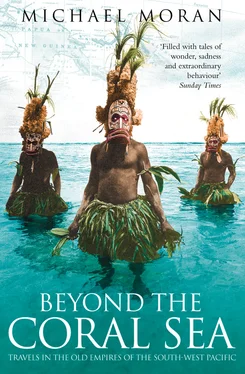‘ Monin tru, ol mangi. Yupela iorait? ’ 1
‘ Orait tasol, bikman. 2 Where do you come from?’ They stood up, even respectfully I thought.
‘England. I live in London. My name’s Michael.’ I held out my hand which was shaken softly. They shuffled about looking at the ground, showing signs of amazement by spitting fast red gobbets in the dust.
‘And you’ve come here! Do you like our country?’
‘Everyone seems pretty friendly to me. What’s your name?’ I asked a boy with the most intense black skin I had ever seen – it was almost blue. He had dreadlocks, perfect white teeth and eyes like an eagle. He appeared highly intelligent, but melancholic shadows fleetingly crossed his features.
‘Gideon. I’m from Buka.’ His open face smiled engagingly.
‘Really! I hope to go there. I’m visiting the islands.’
‘It’s beautiful on Buka, but no work. The Bougainville war destroyed everything. I came to Moresby but can’t get a job. I’ve got my electrician’s certificate.’ The shadows were well established.
‘ Mipela ino inap lon bikpela skul ,’ 1 said a fierce lad with broken, heavily-stained teeth. It looked as though a bomb had gone off in his mouth. He was angry.
‘I come from the Sepik. I have no parents and no money.’ He looked savagely at the ground and started violently peeling a new nut.
‘Are you all unemployed?’ I asked, already knowing the answer.
They nodded dreamily.
‘Don’t you miss your family?’
Silence.
‘I’ve heard that some boys break into houses and steal. Is that true?’ I was living dangerously, considering it was my first afternoon.
‘Yes, but they’re not bad boys, sir. We’re not raskols ! We need the money to eat. We want to work but we can’t get a job.’
‘That’s not really a good reason to steal. You could go to prison. Ruin your life.’
‘Corrupt politicians have ruined our country. You don’t see them going to prison.’ Gideon offered this as a challenge for me to refute.
‘No one gives us a chance. We’re on the outside looking in.’
‘Where are you from?’
‘Chimbu.’ The older man seemed to stand apart from the rest and was more deeply resentful.
‘Where do you live in Moresby?’
‘Are you a priest?’ It was an aggressive answer. ‘Ragamuga. Six-Mile Dump. You’ll visit?’ He smirked and spat into the dust. I had only read about this desperate migrant settlement situated behind a large rubbish dump. No, I did not intend to go there.
‘But what about your future?’ I was moving into a dead-end.
‘So? No one gives a shit about us. Politicians just want money.’ Isaiah was from East New Britain and had parallel tattoos on his cheeks.
‘We’re bored and no future. That’s the problem.’
I realised with alarm that my group had grown into a small crowd that surrounded me. They pushed forward not to attack but desperate to explain, to justify themselves, expecting me to provide an explanation, an instant solution.
‘Everyone hates us. No tourists come because the newspapers report so much violence.’
I said nothing but the headline in the newspaper in my hotel screamed of the rape of three nurses at Mt Hagen Hospital and the theft of an ambulance. The thieves were demanding compensation for the return of the vehicle or they would torch it.
‘Violence is terrible in the Highlands. That’s why I chose the islands.’ I was out of my depth.
‘You’re lucky. You have money to travel,’ said a boy from Oro Province wearing a bedraggled feather in his hair.
Beavis and Butthead cartoons flickered on the screen behind the heavily-barred windows of the ‘Jamaica Bar’. Papuan reggae music was playing somewhere. I was a distraction but not a solution. Some drifted away and sat under the trees again. Large spots of rain from an afternoon storm kicked up the reddened dust.
‘Well, I’d better be going. Nice to have met you. Gideon, Isaiah …’ I shook their hands.
‘ Tenk yu tru long toktok wantaim yu, bikman. 1 All the way from London! Enjoy our country.’
They remained standing and smiling as I headed back. This encounter with wasted potential, cynicism, and the crushed optimism of youth left me feeling depressed and impotent. The cultural diversity of the country meant that there was tension between youths from many regions thrown together by unemployment. In traditional villages in the past, fear of neighbouring peoples and respect for the authority of the elders would have limited the freedom of the young. The notion of respect had almost disappeared, but not only in Papua New Guinea. London and Sydney were similar, but this country was poor and the politicians corrupt.
Many observers blame the present law and order troubles on the premature commitment Australia made to the granting of independence in 1975. At the outset, an inappropriate West-minster-style two-party democracy was imposed on the country with legislative power vested in a national parliament. The national government devolved power through nineteen provincial governments. The country joined the Commonwealth with the Queen as Head of State, and a governor-general appointed as her representative. Papua New Guinea covers a vast area (it is the second largest island in the world) and possesses such extreme cultural diversity that the growth of a properly integrated strategy for development has remained a perennial challenge. The first Prime Minister, Sir Michael Somare, was an able and popular politician, but the many emergent parties have become increasingly unable to establish clear ideological principles. Political candidates pursue personal or regional goals at the expense of party policies. 1
Most Papua New Guineans still live a subsistence lifestyle in villages quite separate from the influence of the cash economy. The villagers have become convinced that, at both the provincial and national levels, politicians are self-serving and uninterested in their welfare. Traditional social arrangements had already begun to disintegrate under colonial rule. The adoption of an inappropriate Western legal system has only exacerbated the agony of cultural fragmentation. Tribal fighting has resumed in the Highland provinces, but under more murderous rules than in the past. As the traditional society in the village disintegrates, many young people flee to the urban ghettoes of Port Moresby and Lae to face almost certain unemployment followed by a descent into crime. The challenge remains to evolve a system that combines the strengths of traditional leadership with the ideals of modern government, giving due legal weight to the fraught claims of land ownership by the numerous clans.
On my return to the ‘executive floor’ of my hotel, I passed psychedelic kiosks and wrecked cars in the oppressive heat and scalding rain. Luxury expatriate enclaves seemed to be going up everywhere on higher ground. Segregation has made this a city divided against itself. The cool, spacious lobby transported me to a different planet to that inhabited by my ‘new friends’ on Ela Beach, and the grim reality of their settlement homes. This was the arena where exploitation and ‘aid’ were strategically planned by company generals. The sunset from the elevation of the executive floor was sublime; copper and tarnished brass shot through with blue. This luxurious scene was decidedly different from the wild 1920s when Tom McCrann’s hostelry in Moresby displayed a notice in the saloon:
Men are requested not to sleep on the billiard table with their spurs on.
At dinner there was an astounding mixture of guests. A tattooed Scot was having dinner with an Asian engineer.
‘Glad you’re on the fuckin’ project, Wang. You’ve got a degree.’
Читать дальше












